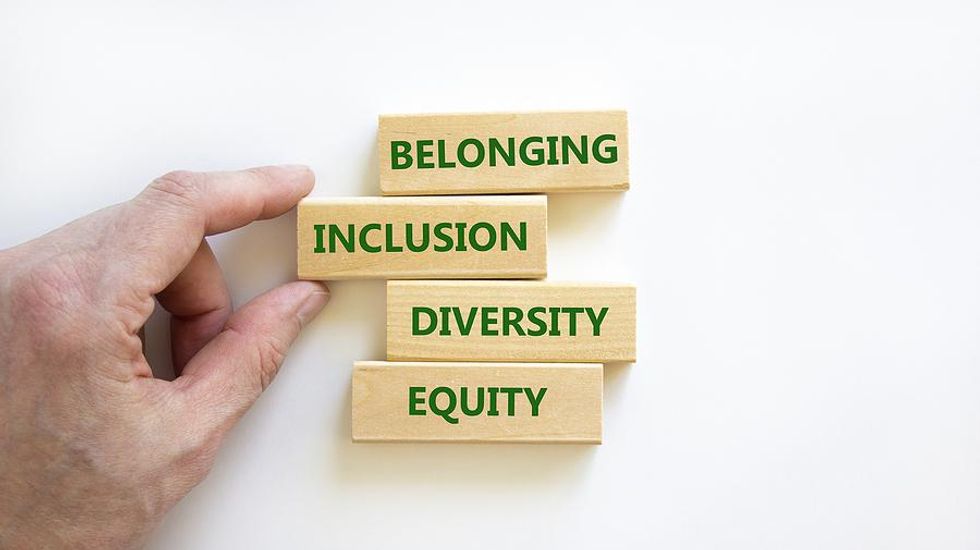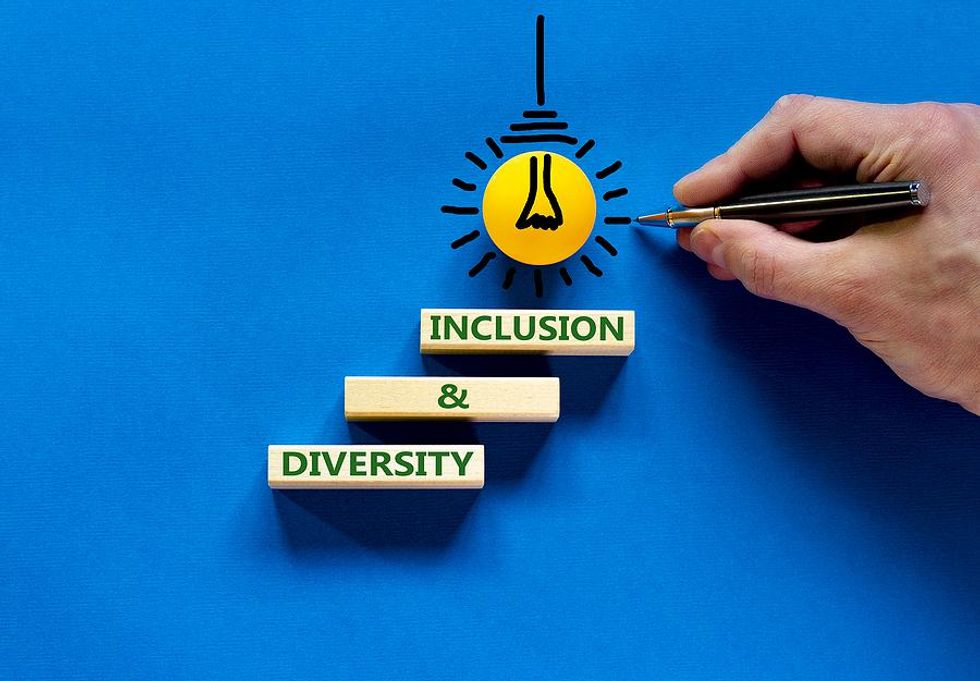DEIB programs are quite extensive and usually involve the entire organization. As such, companies can use project management teams to drive this initiative in an organized, consistent, and targeted way.
The Challenges Of Implementing A DEIB Program

Bigstock
Diversity, equity, inclusion, and belonging (DEIB) are definitely buzzwords that have been around for several years now.
Companies have realized the many benefits of including as many diverse groups as possible in their workforce to arguably appease social pressures or legal requirements, but also when they see how these different perspectives can benefit them in so many ways never before imagined or considered.
Some companies have been unsuccessful in their attempts to employ their DEIB strategy for a number of reasons, including lack of commitment, lack of understanding, or lack of a targeted strategy.
Project management teams can be tasked with this mission and can employ such important concepts as intercultural competence to successfully implement such an ambitious culture change program.
3 Direct Benefits Of DEIB Initiatives

Bigstock
Right away, I can think of three direct benefits of implementing a robust DEIB program:
1. Innovation
From diverse cultures come a myriad of interpretations and ideas which take brainstorming sessions to a whole new level. Many issues previously hidden from sight as well as new, innovative ways of solving organizational problems or mitigating risk tend to surface under such dynamic conditions.
For example, when developing a new global communications app, ensure you include a cross section of people from the BRICS countries so as to truly understand their communication preferences based on infrastructure cultural influences. This could include naming conventions on the menu so as to avoid potentially offensive language or too complex of a layout which could ward off potential users.
2. Morale
Globally, the pandemic has affected different countries in different ways and some would argue that many of the emerging economies may have had a less traumatic experience due to the economic hardships they have endured for many years. As such, targeted efforts to improve morale in these countries need to be implemented based on a detailed review and understanding of the pain points in each case.
Even before the pandemic, most larger companies suffered from steadily declining morale for a whole host of reasons. When companies demonstrate a commitment and openness to be inclusive, the direct impact on morale can be extremely positive at all levels of the organization.
3. Employee Engagement
In some countries such as Brazil, for example, employers have long been criticized for exploiting the population's restricted access to higher education as well as overtly discriminating against certain groups. As such, employees tend to not trust companies as a whole and are always skeptical when new policies, programs, or evaluations are implemented.
As employee morale improves, so does employee engagement which certainly has a positive impact on achieving KPIs. This will, in turn, foster a positive working environment which can certainly lead to greater levels of employee retention.
What Is Intercultural Competence And Why Is It Important?

Bigstock
Intercultural competence is basically the skill of understanding other cultures in such a way so that you are able to communicate more effectively with them. The key word here is EFFECTIVELY as it is not enough to simply speak or employ the same language.
For me, it is a deep dive into cultures so as to better understand what makes people tick and how they process communication of all sorts.
When digging deeper into these cultures, we readily identify:
- Political, socio-economic, and religious filters
- Historical oppression of certain groups and its impact on their behavior
- Geo-political relationships between countries and even ethnic minorities in each country
As diverse and overwhelming as this may sound, there is a way to achieve intercultural competence with the proper amount of study and, of course, an open mindset.
In my lengthy experience as a career expat in the oil & gas industry, I have seen how companies have fallen short on this important topic, even for cultures that were not so different than that of the home office in Houston.
Our already internationally connected world has become so interdependent today that companies can no longer ignore this issue as they risk serious misstepping which can have disastrous consequences when damage control has to be implemented due to an "international incident."
Project management teams are usually composed of cross-functional and multicultural teams and are an excellent choice to educate companies regarding cultural issues while offering feedback from lessons learned sessions in which these issues were identified, mitigated, and used as assets for future projects.
Using Intercultural Competence To Attract And Retain Top Talent
 five human hands on brown surfacePhoto by Clay Banks on Unsplash
five human hands on brown surfacePhoto by Clay Banks on UnsplashThe Great Resignation of 2021 has descended on the United States with such a loud boom that it has seemingly permanently altered the employee-employer dynamic. Companies are scrambling to replace lost talent as well as retain their biggest performers.
I can see how companies can bridge this gap and move towards a more sustainable talent retention metric by implementing DEIB programs with appropriate intercultural competency training.
This needs to be done top-down so that people of all cultures, generations, ethnicities, handicaps, and gender (to name a few) can see that top management really understands the difficulties they have encountered both in life and in the workplace, and that they are committed to creating a more harmonious, inclusive space for everyone.
When these biases are removed from the hiring and promotion processes, the message is then clear that opportunities will be available to all, based on skill set and performance as well as other non-discriminatory factors.
In other parts of the world, the Great Resignation has not occurred nor will it to the same extent we are seeing in the U.S. This is mainly due to cultural perceptions of the employee-employer relationship, labor laws in some countries which require employment contracts, pensions, and legal protections not afforded to their American counterparts. France and Brazil are two such countries which offer much higher levels of protection to the employee, sometimes at the behest of U.S. multinationals.
From a project management perspective, I could easily see how a dedicated project team could map out the composition of the current workforce, the locations in which the company operates, and then scope deliverables targeted to identify synergies, major disconnects, as well as opportunities to streamline the DEIB initiative. Once this is done, the training programs can be developed with HR spearheading the initiative.
How To Use Intercultural Competence As Part Of The DEIB Strategy

Bigstock
When I worked on a project in Brazil, we had an urgent need for four technicians to service valves on an offshore installation. The vice president of project management located the technicians in record time and proceeded to affirm that they all spoke Spanish so "we were good." He could have obviously benefitted with better cultural knowledge of Brazil.
I could certainly list many examples but the point is that many corporations (in the U.S. at least) have really never grasped the fundamental importance of truly connecting their top managers with their teams in other countries, not to mention the diversity they have right at home!
So, how do you get these executives up to speed?
Cross-cultural training across business functions is a definite must for mid- to senior-level executives who work in multinational corporations and obviously needs to be adapted to the circumstance whether the executive will be deployed as an expat or not.
You also need champions!
The top-down approach will then require champions at all levels of the organization, much like any significant culture change project would require for successful implementation.
So, how long will it take?
Due to the size of the corporation, its geographical footprint, as well as the complexity and variety of cultural issues to be covered, it could certainly take a number of years to fully implement the DEIB initiative.
Companies can certainly leverage social media to help shorten the implementation cycle, as long as they are aware of the generational preferences for each of the platforms so that they reach as many of their people as possible.
Other intergenerational communication styles (face-to-face, email, messaging, etc.) can also be used to speed up the process.
DEIB Needs To Be A Carefully Managed Top-Down Strategy

Bigstock
For companies to survive in an already challenging and increasingly complex world, a well-implemented diversity, equity, and inclusion strategy at all levels of the organization will be key. Companies cannot forget to apply the multicultural filters to this strategy so that global implementation is possible, especially when you consider the higher number of people working remotely across the globe.
Companies may choose to gradually implement the program over time so as to minimize impact on budgets while ensuring that they are communicating effectively with the increasingly diverse workforce.
Leveraging project management resources will certainly drive the initiative in a focused manner.
Business executives can certainly do their part to fully support the initiative as well as play an active role by utilizing such techniques as intercultural competence to sharpen their skills and maintain their relevance as key influencers for whom the diverse workplace will want to work.
Whatever the case may be, social media will definitely provide quality checks for companies, so a robust social media strategy will be vital for long-term business continuity.




